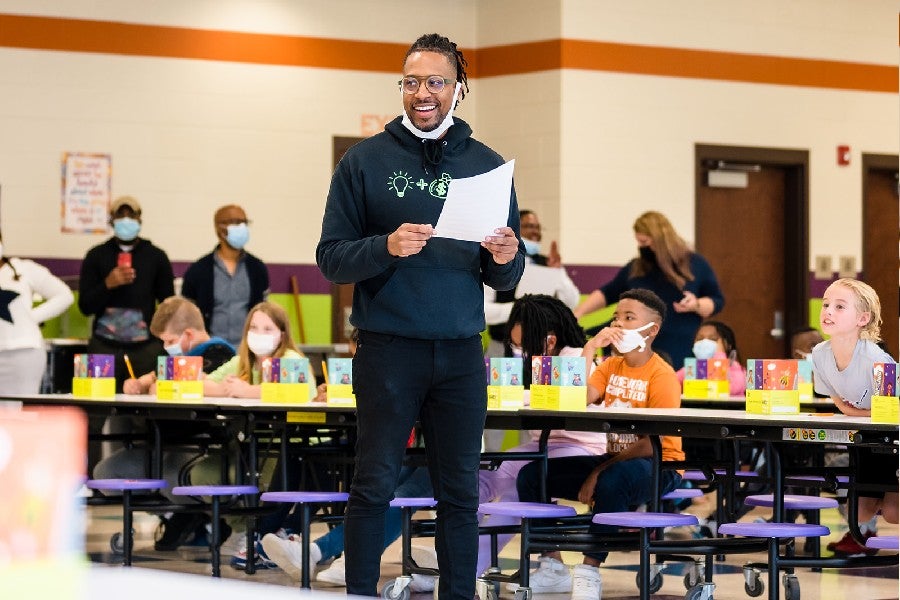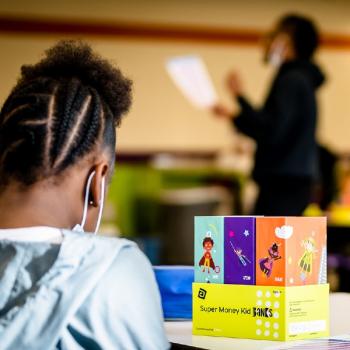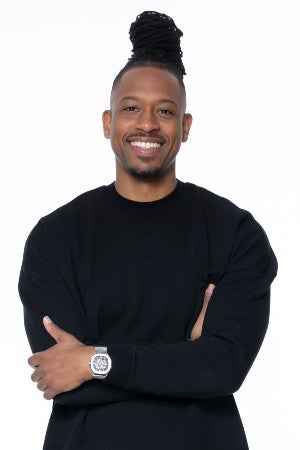MBA alumnus builds students’ super skills through Super Money Kids Co.
Courtney Hale, an ‘accidental entrepreneur’ works to lead students to career fulfillment through financial literacy.
Janel Shoun-Smith |

Courtney Hale (MBA ’10) likes to tell people: “I’m the most accidental entrepreneur you’ll ever meet!”
But that doesn’t mean he doesn’t have skills. In fact, he’s passing on to today’s youngsters all over the nation the finance skills that carried him beyond his family’s humble roots in Nashville through his social enterprise: Super Money Kids Co.
Across the nation, students from elementary school age to university-level are “becoming a generation of financially knowledgeable, responsible and empowered youth” through the Super Money age-specific curriculums, Hale told the Nashville Business Journal (NBJ) in September.
Elementary school students learn personal finance through the Super Money Kid Bank, three bright, colorful boxes designed to collect, designate and keep records of small change allocations for saving, spending and sharing. Middle school students are learning how products all over the world are produced, learning global economics through the lens of a child. High school students are learning how to trade stocks, how to build credit and how to plan to make financially savvy decisions after high school.
Nashville-based Super Money has taken off since 2020, with a core group of 10 people responsible for bringing its programs to more than 25,000 students nationally who have saved more than $300,000, said Hale. In 2021, the nonprofit was featured nationally on the Ellen Show, and Hale received the NBJ’s 40 Under 40 Award, which recognizes the faces that will shape Nashville in the years to come.

After four years of working, networking and fundraising, Super Money now has a grant funding the provision of Super Money Teens programs to all of Nashville’s public high schools. Among the venture’s sponsors to get the programs into Nashville schools are the United Way of Middle Tennessee, St. George’s Episcopal Church and Jackson insurance.
“Younger generations are responsible for more financial decisions than any generation before them, with greater consequences if they don’t earn enough or manage their money well. It’s our responsibility as adults to make sure our young people are able to navigate the world, plan for the future, be self-sufficient and build wealth,” Hale told the NBJ.
As evidence: the most-asked question from kids in Super Money programs is about investing, says Hale. So today’s elementary students learn the concept of saving for “a rainy day, a sunny day and a change in the forecast,” he said. “Rainy days are emergencies, sunny days are financial goals and a change in the forecast is where your money grows to the point where if you want to change the season, you can fly somewhere else and do it. And you do that through investing.”
Growing up in Nashville, Hale lived with his mother and grandfather in the Bordeaux area of Nashville and would often visit his grandmother in North Nashville on 27th Avenue North, a neighborhood he remembers as plagued by crime and drugs.
It’s our responsibility as adults to make sure our young people are able to navigate the world, plan for the future, be self-sufficient and build wealth. — Courtney Hale
“I like to say that financial literacy became my metaphorical exit out of that community,” he said.
In school at Hunters Lane High School in Madison, he became part of the Inroads program, an organization for talented, underrepresented teenagers to help them obtain internships. He earned his bachelor’s in economics and finance at Tennessee State University in 2006 and began working in financial services in Nashville. Still feeling that pressure to accelerate his career and his salary, however, he then pursued his MBA at Lipscomb.
“I saw my career trajectory as being: I will go work for a really cool Fortune 500 company and climb the corporate ladder. In a lot of ways, that's really what I was prepared for,” he said.
Armed with his MBA, he did advance in his career but along the way something changed, and he started thinking less about getting out of his old neighborhood and thinking more about how he could help other youth succeed beyond their own neighborhoods.
“I remembered some of the conversations I had with Turney Stevens [the dean of Lipscomb’s College of Business during Hale’s graduate studies],” said Hale. “He used to always talk about finding a problem that you could solve. He said, ‘The best thing you can do for your career is to find a problem that someone is really struggling to solve, and solve it. If you do that you’ll have job security and income security and you can do that anywhere.’”
Working in the finance industry, Hale had always been passionate about financial literacy. “I saw kids entering adulthood unprepared. The statistics facing young people weren’t favorable in terms of job stability and the affordability of housing,” he said. “We need to be a little more sophisticated in how we are preparing young people to become adults. That was an issue I wanted to tackle.”

Stevens, a longtime successful Nashville entrepreneur, was one of the first people Hale consulted when he wanted to be more involved in addressing youth financial literacy. Stevens later became one of the first members of the board of directors of Hale’s social enterprise.
Hale at first established his nonprofit with the name Knowledge Bank and started operations with an in-person summer program for teens in 2012. He was happy in his job and “just wanted to do something that was good for the community,” he said.
After the summer camp had been in operation for a couple of years, the YMCA came to Hale asking him to develop a financial literacy curriculum to incorporate into their educational programs. “That was the first time that I got paid for my financial literacy hobby,” said Hale.
Hale began to see the entrepreneurial possibilities. He got more contracts and eventually made a deal with the city of Nashville to be the financial literacy provider for the city’s summer youth employment program at the time.
“I had not done anything on a big scale like that, but one thing I knew about entrepreneurship was, when you get a big opportunity, the answer is always, ‘Yes!’ After I got that contract, I knew I was on to something, and I could make a living doing this work.”
He left corporate finance work around 2019, taking a huge pay cut to pursue his passion which at that time was focused on Middle Tennessee. Then he and his Knowledge Bank group developed the more marketable Super Money Kids Co. brand and logo and suddenly the product began to take off nationally in 2020. Momentum was building, financial institutions began sponsoring use of the curriculum in particular schools and a network of volunteers was recruited.
Then the Covid-19 pandemic hit. That same year, his wife Tia passed away, leaving him a single dad of his daughter Ever, now 9 years old.
I had not done anything on a big scale like that, but one thing I knew about entrepreneurship was, when you get a big opportunity, the answer is always, ‘Yes!’ — Courtney Hale
While struggling to figure out what to do next, Hale contacted friends who helped him digitize much of the curriculum, and as a result, a lot of schools across the nation that were trying to figure out how to do virtual learning, turned to Super Money as an online resource that could be easily incorporated into digital curriculums.

Courtney Hale and his daughter Ever appeared on the Ellen Show.
“That really accelerated a lot of our growth,” Hale said. “Now we have partners, schools and universities, in Alabama and Chicago, Washington D.C., Maryland and Houston. Even in the midst of the pandemic, I knew I would never go back to in-person again. I knew what the future was.”
Super Money’s financial literacy programs undergird what Hale sees as the most important skill any young person can have as they grow up to face the world: being able to identify and market their own talents and gifts. Hale says he has seen so many of his generation use college as a way to make more money in a field that didn’t really make them happy.
What he hopes for the next generation is that they use a college education, their network of relationships and the vast array of digital tools around them to propel themselves toward making a career out of their own special talents and desires. Young people who recognize what they are good at, and ways to make a living at it, are much happier, more fulfilled adults, he said.